
Owner & Attorney - Atlanta Personal Injury Law Firm
This article has been written and reviewed for legal accuracy and clarity by the team of writers and legal experts at Atlanta Personal Injury Law Firm and is as accurate as possible. This content should not be taken as legal advice from an attorney. If you would like to learn more about our owner and experienced Georgia personal injury lawyer, Nathan Whittenburg, you can do so here.
Atlanta Personal Injury Law Firm does everything possible to make sure the information in this article is up to date and accurate. If you need specific legal advice about your case, contact us. This article should not be taken as advice from an attorney.
On this page, we’ll discuss how damages in personal injury cases are calculated, what damages in personal injury cases typically include, the process by which a personal injury lawyer assesses and calculates damages, and much more.
The concept of damages in personal injury claims refers to the monetary and non-monetary costs associated with an accident.
These damages are typically divided into two main categories: economic and non-economic.
Economic damages include tangible costs like medical bills, lost wages, and rehabilitation expenses that can be quantified and directly linked to the accident.
Non-economic damages encompass less tangible losses, such as pain and suffering, emotional distress, and loss of enjoyment of life, which are subjective and more challenging to measure.
A personal injury lawyer meticulously assesses and calculates both economic and non-economic damages by gathering comprehensive medical records, evaluating the accident’s impact on the victim’s life, and consulting relevant experts.
A comprehensive calculation of damages is vital, as it provides victims with compensation that reflects both immediate losses and future needs while considering the accident’s lasting impact on their quality of life.
An experienced personal injury lawyer will assess damages by calculated related expenses, addressing the losses incurred, and evaluating the long-term impact of the injury on the client’s lifestyle and earning capacity.
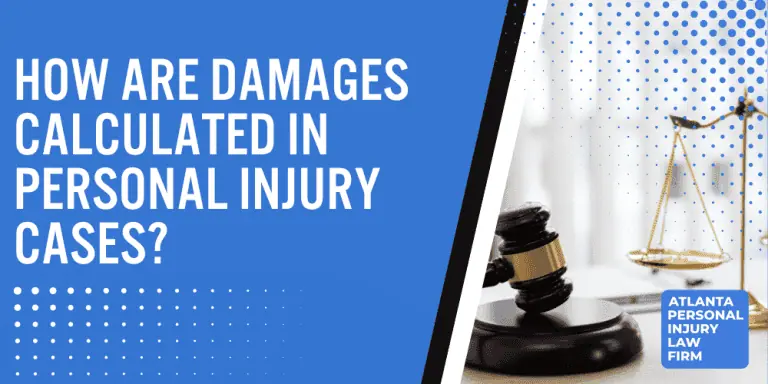
If you or a loved one were injured at no fault of your own, you may be eligible to file a personal injury lawsuit and seek compensation.
Contact the Atlanta Personal Injury Law Firm today for a free consultation.
You can also use the chatbot on this page for a free case evaluation and to get in touch with us.
Nathan Whittenburg, our founder and experienced Atlanta Personal Injury Lawyer, helps people who have been injured in car accidents and other motor vehicle accidents across the state of Georgia.
In personal injury cases, damages represent the monetary compensation awarded to victims to address their losses and suffering resulting from an accident.
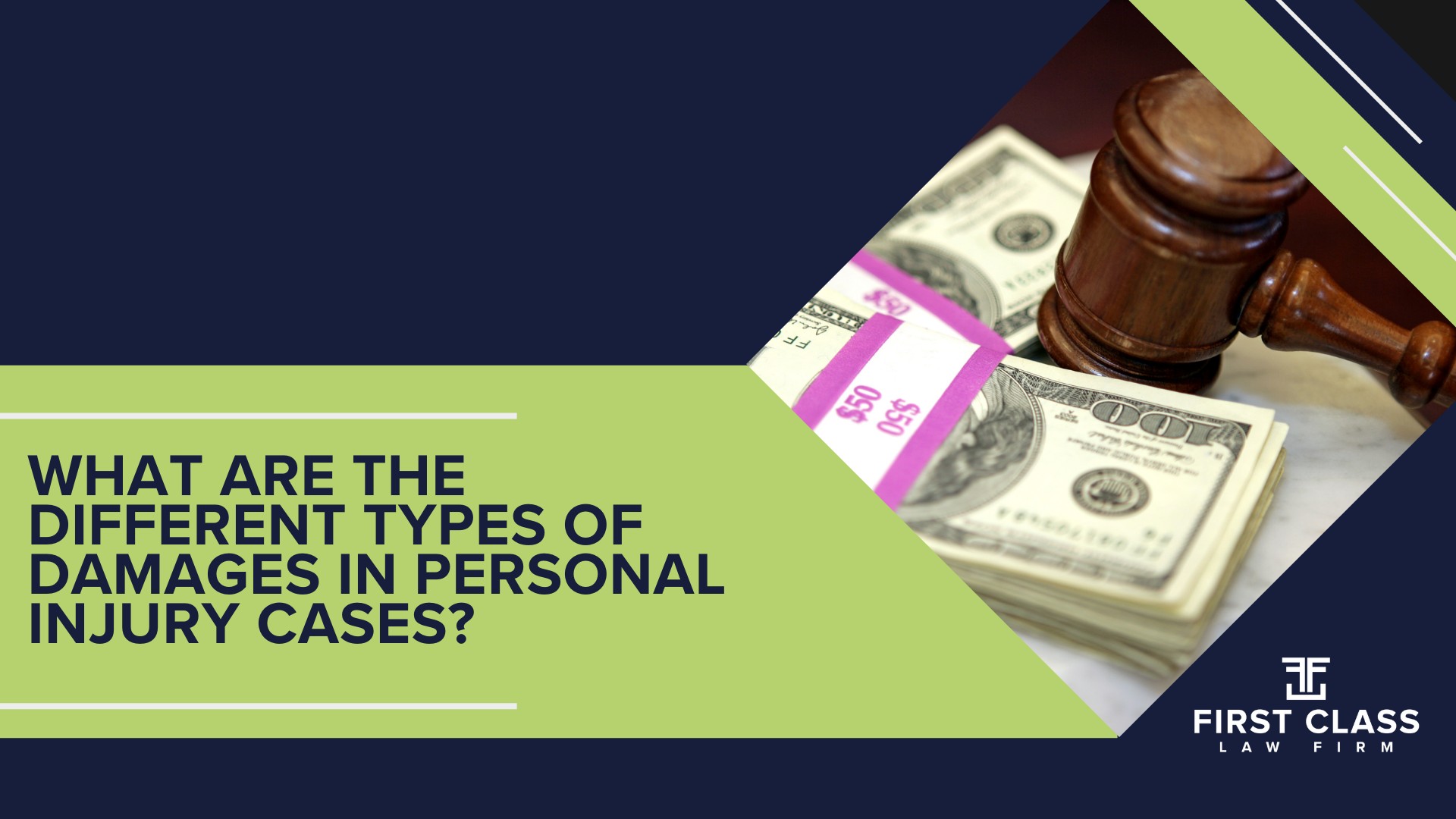
Damages are assessed based on the severity of injuries and the impact on the victim’s life, applying principles of fairness to restore the injured party financially and emotionally.
The concept of damages aims to provide a measure of relief and accountability that aligns compensation with the nature and extent of the harm endured.
Economic damages, also known as “special damages”, are the tangible financial losses a victim incurs due to an accident, covering costs directly tied to injuries and their impact on daily life.
Economic damages can be easily quantified and documented, providing a clear basis for compensation in personal injury claims.
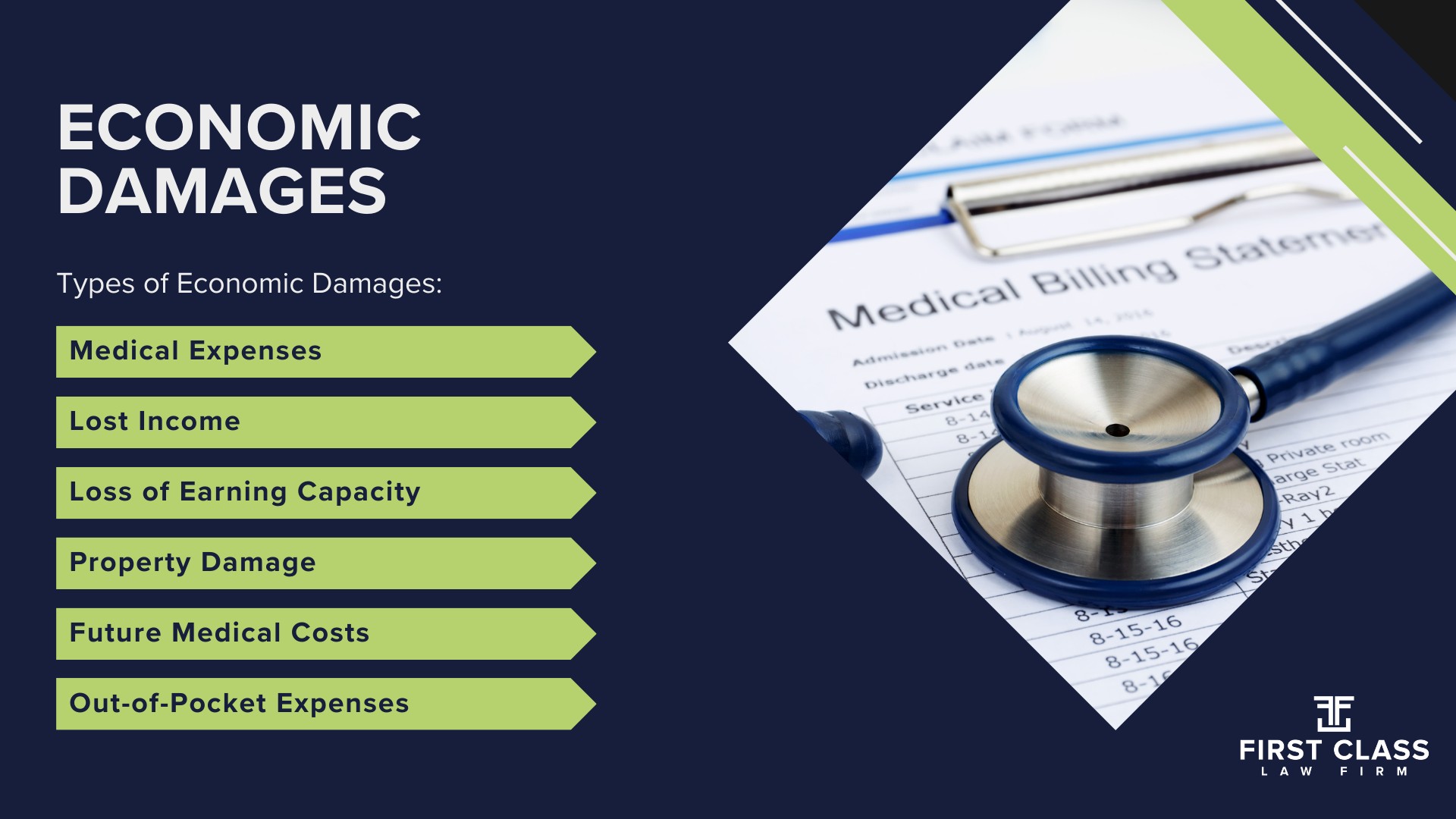
Types of Economic Damages:
Non-economic damages, also known as “general damages”, represent the intangible or non-monetary losses a victim suffers following an accident.
Non-economic damages address the ways in which the injuries affect a victim’s quality of life and personal well-being beyond financial losses.
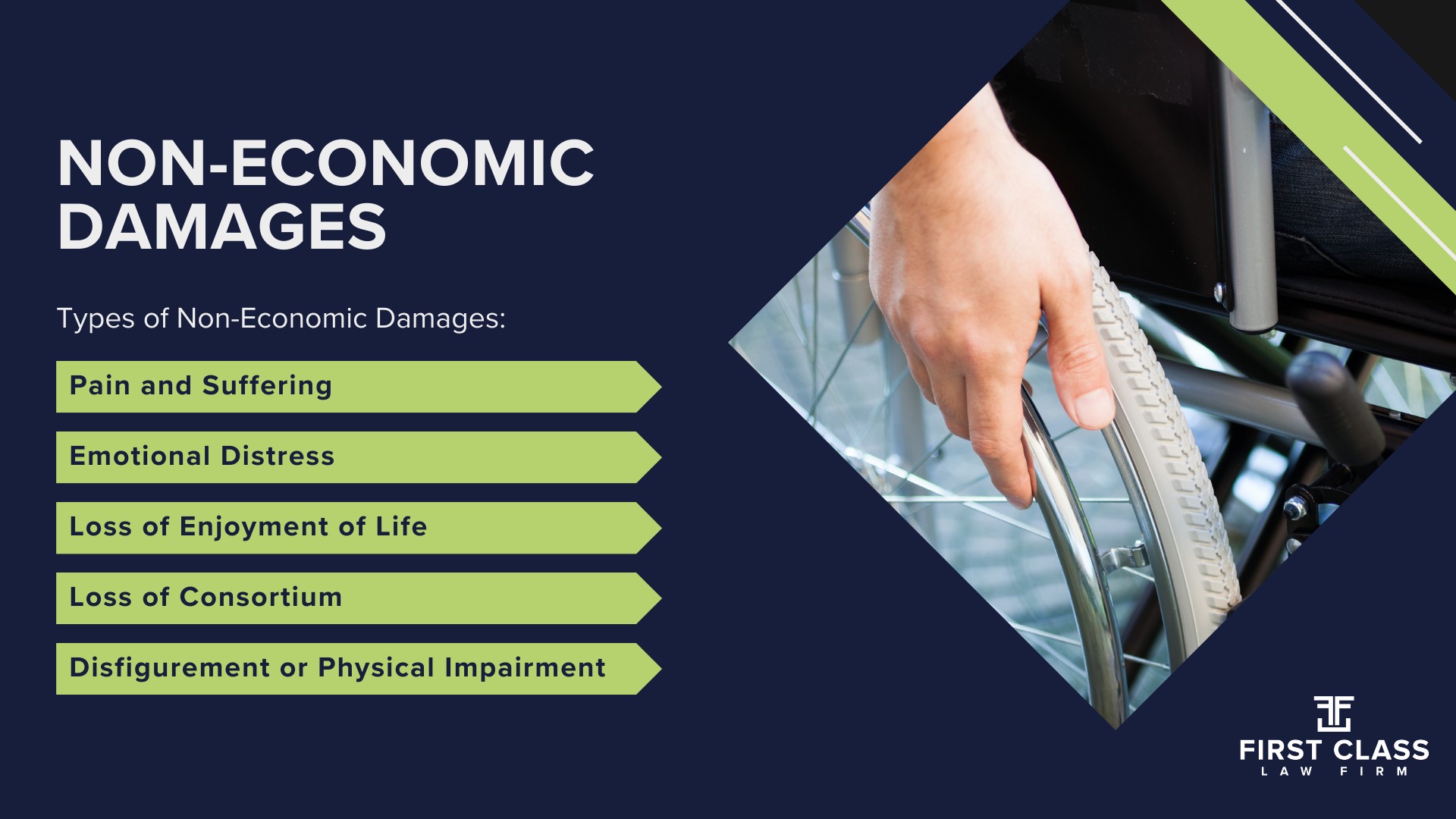
Types of Non-Economic Damages:
Compensatory damages in personal injury cases focus on addressing the financial and personal losses suffered by victims due to an accident, and include both economic damages and non-economic damages, which are explained above.
The goal of compensatory damages is to help victims recover financially and emotionally by covering their immediate and long-term needs.
Punitive damages, on the other hand, are intended to punish a defendant for particularly extreme or gross negligence, serving as a deterrent to prevent similar conduct in the future.
Punitive damages go beyond compensating the victim and are awarded to make an example out of egregious conduct and hold the responsible party fully accountable.
However, punitive damages are rarely awarded because they require clear and convincing evidence that the defendant acted with intentional misconduct or complete disregard for safety.
Courts carefully assess the circumstances to ensure this level of negligence is present before deciding to grant punitive damages.
A personal injury attorney assesses damages by thoroughly analyzing the nature and extent of the victim’s injuries, financial losses, and overall impact on quality of life.
Personal injury lawyers examine medical records, wage statements, and expert opinions to understand the immediate and future expenses related to treatment and rehabilitation.
The attorney and their legal team also considers non-economic factors like pain and suffering, emotional distress, and reduced enjoyment of life, using these elements to establish a comprehensive claim.
Consulting experts helps calculate long-term losses like diminished earning capacity and the cost of future medical care.
A detailed assessment provides a strong foundation for negotiations with insurance companies and builds a compelling case if the matter goes to trial.
Assessing damages is conducted on a case-by-case basis to accurately reflect each victim’s unique injuries, financial losses, and emotional impacts arising from the specific circumstances of their accident.
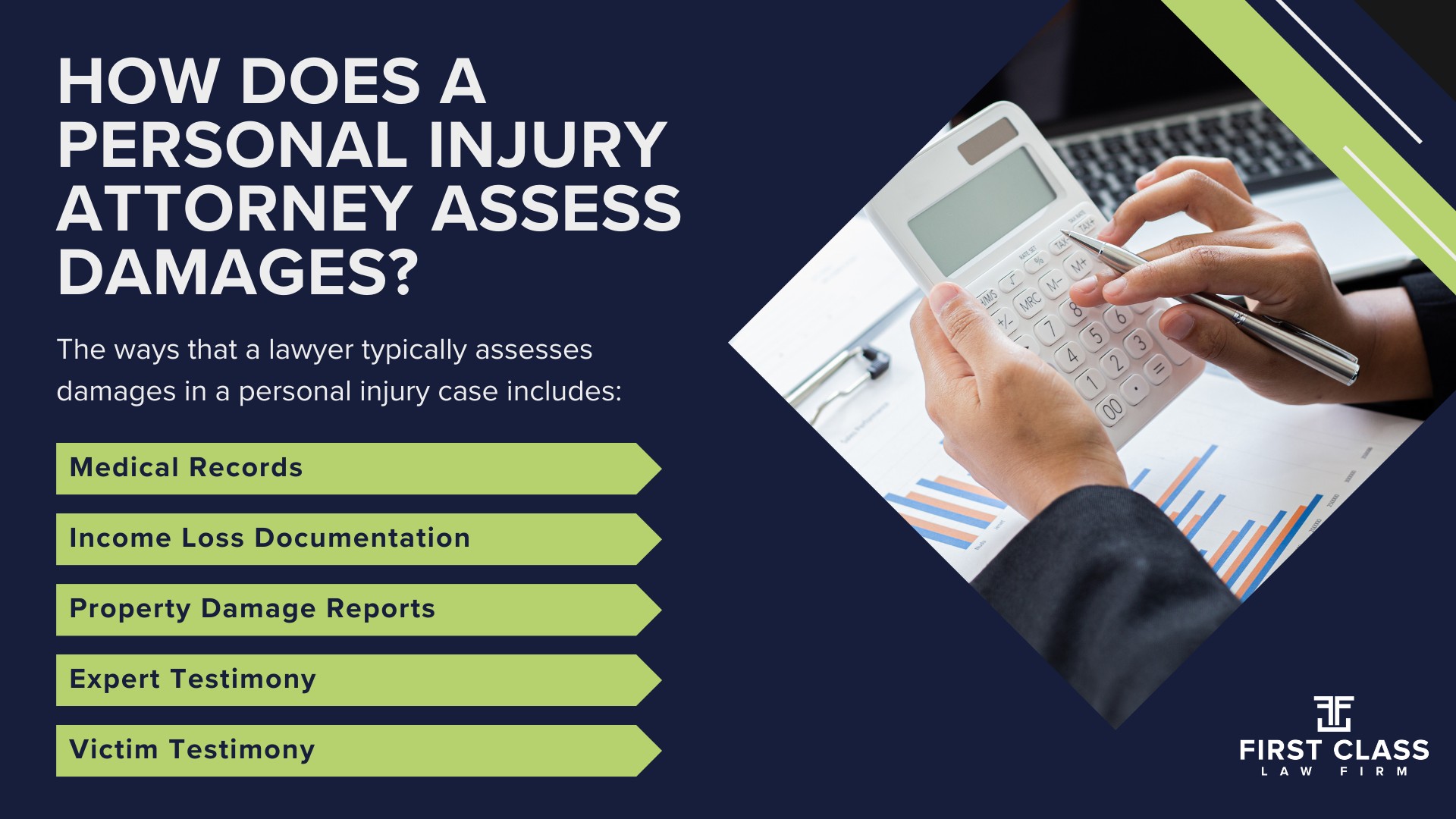
The ways that a lawyer typically assesses damages in a personal injury case includes:
Lawyers use various methods to calculate personal injury damages based on the nature of the injuries and their impact on the victim’s quality of life.
The multiplier method is a common approach for determining non-economic damages, multiplying the total economic losses by a factor that reflects the injury’s severity.
Another method, known as the “per diem” approach, assigns a daily rate to the pain and suffering endured, applying this rate over the expected recovery period.
Attorneys also consult with experts and analyze case precedents to ensure their calculations align with previous similar claims.
Types of Methods Used:
In this example, we explore a hypothetical personal injury case where an individual was T-boned at an intersection through no fault of their own.
The collision resulted in broken bones, whiplash, and a significant back injury, causing the injured person to miss a significant amount of work.
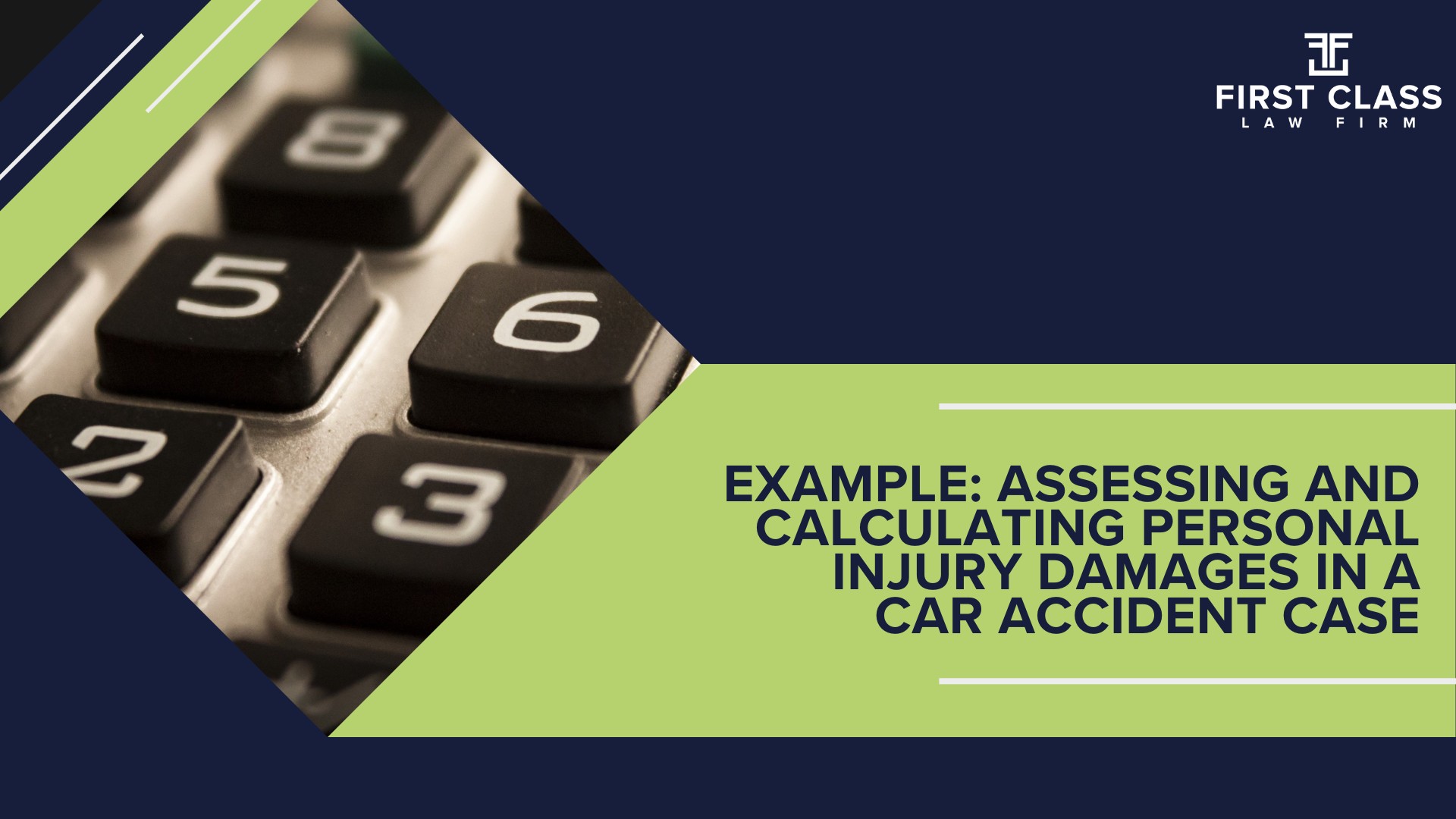
Sarah was driving through a green light at an intersection when another car, failing to stop at a red light, T-boned her vehicle on the driver’s side.
Immediately after the accident, emergency services were called, and Sarah was transported to the hospital.
Her injuries were diagnosed as multiple fractures in her left arm, severe whiplash, and a lumbar spine injury.
Due to the nature of her injuries, Sarah was unable to return to work for two months and required extensive medical treatment including surgery, physical therapy, and ongoing pain management.
After stabilizing her medical situation, Sarah contacted a car accident lawyer to help manage her insurance claims and seek fair compensation.
The lawyer played a crucial role in gathering all pertinent documentation from Sarah’s medical treatments to establish a clear link between the accident and the injuries caused.
The car accident lawyer meticulously documented Sarah’s medical expenses, the cost of physical therapy, and the impact of the injuries on her daily life and work.
The lawyer calculated economic damages by summing up the total medical bills, including surgery and physical therapy, and added the monetary value of Sarah’s lost wages for the month she missed work.
They also evaluated non-economic damages for pain and suffering due to the severity of the injuries and the significant disruption to Sarah’s lifestyle.
To calculate non-economic damages for pain and suffering, the lawyer employed the multiplier method, which involves multiplying the total economic damages by a factor that reflects the severity and permanence of the injuries.
Given the significant impact on Sarah’s quality of life and the intensive nature of her injuries, a higher multiplier was justified.
This method helped provide a clear, justified monetary value for the less tangible aspects of Sarah’s suffering.
The lawyer analyzed Sarah’s:
Using this detailed assessment, the lawyer approached the insurance company of the at-fault party to negotiate a settlement for the personal injury claim.
The lawyer emphasized the at-fault party’s liability and the extensive suffering endured by Sarah.
Through this negotiation, they sought to ensure that the compensation covered all of Sarah’s current and future medical expenses, her full wages, and an additional amount for pain and suffering.
In this example, Sarah’s lawyer was instrumental not only in handling the legal and insurance complexities but also in ensuring that every aspect of Sarah’s damages was fairly compensated.
Securing an experienced personal injury lawyer is highly recommended when seeking compensation for damages incurred as a result of someone else’s negligence.
An experienced personal injury attorney not only understands how to quantify both tangible and intangible losses accurately but also has the negotiation skills necessary to go up against the insurance company of the at-fault party.
The advocacy of a personal injury lawyer can help obtain fair compensation that the injured party deserves.
If you’ve been injured due to another party’s negligence in the State of Georgia, the Atlanta Personal Injury Law Firm may be able to help you.
Contact us for a free consultation, or use the chatbot on this page to find out if you qualify to file a personal injury case instantly.
We’re here to help you.
Damages in a personal injury claim are forms of financial compensation awarded to individuals who have suffered injuries due to another party’s negligence or intentional actions.
Personal injury damages aim to cover medical bills, lost income, pain and suffering, mental anguish, and other losses.
Damages are designed to restore the injured party to the financial position they would have been in if the injury had not occurred.
In more severe cases, damages may also include compensation for future medical care, ongoing therapy, and potential loss of future earnings if the injuries lead to long-term or permanent disability.
Compensatory damages are intended to compensate the injured party for their direct losses, both economic (like medical bills and lost wages) and non-economic (such as pain and suffering).
Punitive damages are awarded in cases of egregious misconduct to punish the offender and deter similar future behavior.
Pain and suffering are typically calculated using either the multiplier method, where actual damages are multiplied by a number between 1.5 and 5 based on the severity of the injury.
The per diem method is also used to calculate pain and suffering by assigning a daily value to the pain and multiplying it by the number of days the victim is affected.
Yes, you can still claim damages if partially at fault, but the compensation may be reduced by a percentage equivalent to your share of fault.
This is based on the “comparative negligence” rule, which varies by state.
In Georgia, the rule of modified comparative negligence applies, which allows you to recover damages as long as you are less than 50% responsible for the accident.
If you are found to be 50% or more at fault, you are barred from receiving any compensation under Georgia law.
To increase your chances of receiving fair compensation, you must promptly seek medical attention, document all expenses and impacts related to the injury, and consult a qualified personal injury lawyer who can represent your interests in negotiations or court proceedings.
A personal injury lawyer can assess the full extent of your damages, including those that might not be immediately apparent, and ensure that every element is accounted for in your personal injury claim.
Your legal team will also handle all negotiations with the opposing insurance company, using their expertise to counter lowball offers and advocate for a settlement that truly reflects the severity of your injuries and losses.
Damages in a wrongful death case are calculated by considering a range of factors including the deceased’s earning potential, medical expenses incurred prior to death, funeral costs, and the non-economic impacts on surviving family members, such as loss of companionship and emotional distress.
Since every case is different, the method of calculation may vary depending on the individual circumstances of the case, such as the age and health of the deceased at the time of death and the degree of financial dependency of the survivors.
It is essential to contact a lawyer who can provide a detailed assessment based on the specifics of your case.
An experienced attorney will guide you through the legal process and ensure that all potential damages are thoroughly evaluated and claimed.
Our firm specializes in personal injury cases across the state of Georgia, working on a contingency fee basis to ensure the best possible service for each client.
Click below to get a free, instant case evaluation and find out if you qualify for legal action immediately.
Would you like our help?
Atlanta Personal Injury Law Firm specializes in personal injury cases across Georgia, including motor vehicle accidents, premises liability, catastrophic injuries, and wrongful death claims. Our experienced Georgia injury attorney works on a contingency fee basis, ensuring you only pay legal fees once we secure your settlement or verdict.
Contact our experienced legal team by phone or visit our website for a instant case evaluation. Trust Atlanta Personal Injury Law Firm for dedicated legal representation in Georgia.
Our firm specializes in personal injury cases across the state of Georgia, working on a contingency fee basis to ensure the best possible service for each client.
Click below to get a free, instant case evaluation and find out if you qualify for legal action immediately.
Would you like our help?
Disclaimer: “Don’t Pay Unless You Win” and similar language refers only to fees charged by the attorney. Court costs and other additional expenses of legal action usually must be paid by the client. Contingent fees are not permitted in all types of cases. This website is an advertisement. Nothing is meant to be taken as legal advice or to give the impression that an attorney-client relationship has been created. Please speak with a legal professional.